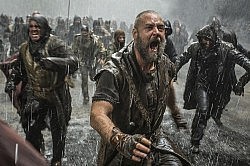The near-defunct genre known as the religious epic gets the aggressive 21st-century facelift that no one asked for in Noah. director Darren Aronofsky’s long-awaited followup to his delirious Black Swan.
It’s easy to be dismissive of a film like this. Taken at face value (and a terrible marketing campaign), it has the strained box of a History Channel original production. But there is much to savour.
Evolutionary creationism has never been presented like this before. The frenetic montage technique that so memorably burned through every kind of narcotic abuse imaginable in Aronofsky’s breakthrough Requiem for a Dream now guides us through countless millennia of celestial evolution that includes gigantic obsidian angels.
Aronofsky’s growing body of work may seem intensely disparate, but beneath the veneer of much kinetic editing beats the common heart of overwhelming internal burden. His central figures characteristically possess an almost devastating “gift” that consumes both their physical as well as psychological states.
Here, Noah’s fearsome visions — sent from the almighty Creator (God is never said explicitly) ordaining an impending calamity — rapidly shift from familial quest to fervent, solitary duty.
Aronofsky’s previous Black Swan sailed similar seas. Natalie Portman’s depiction of an obsessive ballerina destroying herself in the name of perfection spirals into savage and desperate mental territories. The fallen angels that populate his dreamscapes yearn for redemption but they don’t always receive — or deserve — it.
Portraying Noah as tortured and at times outright detestable is a wise decision — and lead Russell Crowe is in fine Gladiator form.

Opening with a slightly worrying pseudo-animated reel that dispels with much familiar exposition, Aronofsky’s thumbprints are initially difficult to detect. The deliberately ambiguous setting and relatively austere design encase a ubiquitous parable in a pleasingly post-apocolyptic scenario that shrewdly combines aspects of Sumerian and Mesopatamian flood mythology.

Essentially storyboarded as a French-published graphic novel entitled Noah: For the Cruelty of Men by Aronofsky and Ari Handel, the film is refreshingly frank in its unrelentingly grim portrayal of how low the masses will sink in times of absolute crisis. Before you know it, human trafficking and cannibalism are law and seal the fate of the many depraved unchosen creatures that will soon perish beneath the holy waters. A harrowing scene features Noah and his family silently eating a meal while the cries of the damned wail outside.
It is around this halfway point that the narrative sharply shifts from a hugely ambitious atypical epic to a more intimate chamber drama. Months within the confines of the ark create some colourful problems. The ever-excellent Ray Winstone provides some welcome human villainy, even if his dialogue is paper thin.

Despite the shattering beauty of the visuals, the film possesses a distinctly confused dynamic — as if it never knows who or what it wants its audience to be. Obviously appealing to a religious demographic, who may be in for a bit of a shock by the delivery. You know that the visionary behind that scene in Requiem for a Dream wouldn’t be merely dusting off some sword and sandals for a paint-by-numbers Demille rehash, or attempt to guilt you back to church à la The Passion of the Christ.
Bound to be one of the most polarizing films of the year and oozing cult potential, we can categorize this one as a noble failure.
Noah – Official Trailer
Photos courtesy of Paramount Pictures



























